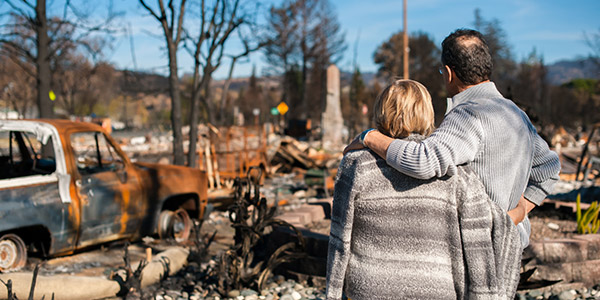Homeowners
Who to Call After a Disaster
October 2, 2018
From Carolina hurricanes to California wildfires, natural disasters are striking with increasing vengeance, carving a trail of destruction across communities nationwide. For 2017, the National Oceanic and Atmospheric Administration (NOAA) estimated the total cumulative damage of floods, fires, and other weather-related catastrophes totaled $306.2 billion, a U.S. record.
These staggering losses beg the question if a fire, flood, tornado, hurricane, or earthquake struck your home or community, would you know the first steps to take?
Would you have the financial resources to rebuild your home or buy another one? And if not, would you know where to turn for help and assistance?
If you didn't answer with overwhelming certainty and confidence, here are some critical first calls to make following a natural disaster that could aid your recovery.
Call No. 1 – Emergency Personnel
After ensuring your safety and your family's, use whatever communications you have available (call, text, email, or post to social media) to inform emergency authorities of your situation. Also go online to disaster relief sources like disasterassistance.gov, which lists nearby hospitals and FEMA Disaster Recovery Centers.
Call No 2 – Your Insurance Company
As soon as you're safe, reach out to your insurance company or insurance agent immediately. Inform them your home has been damaged or destroyed. In response to your call, your insurance company will open a claim for you and send you claim forms within a legally specified period. Keep notes of all conversations, correspondence, and receipts, which may come in handy if aspects of your claim are later disputed.
After receiving the forms, detail the damage to your house in the paperwork and compile a list of the items lost along with the house. Be as detailed and complete as possible. If conditions permit, take photos of the damage and, if available, locate photos of your home before the damage. If you haven't been the victim of a disaster, take photos of your home now and save them on a secure digital platform so you have a photographic record of your valuables.
Typically, homeowner's insurance policies cover damage caused by fires, lightning strikes, windstorms, and hail, but not damage from earthquakes and floods.
Most likely, your policy will enable you to rebuild or repair your home. If you have an "actual cash value" policy, you're entitled to the amount of money it will take to return your home or its contents to its market value before the disaster. This can be a good thing or a bad thing. For instance, if it was already in need of repairs, your compensation may be significantly less than what you'll need for a quality rebuild.
If you have "replacement cost" coverage, you're entitled to the amount it would take to replace the home or contents, up to a limit that was listed in your policy. With replacement coverage, you're not limited to rebuilding on the same site. If a new site costs more, you would simply pay the difference.
Your homeowner's policy should also include a "loss of use" clause, which entitles you to living expenses while you're out of your home. For example, if you're forced to flee without your items, you can purchase these necessities and be compensated for them later. Save your receipts, but don't go Gucci if you normally shop at Target.
If you don't have the money to cover these initial living expenses, you can ask your insurance carrier for an advance against your eventual claim.
Your homeowner's policy also offers personal property coverage – things like couches, beds, and appliances. It's not unusual for a homeowner to have replacement coverage for their home, but only a cash value policy for their items.
Call No. 3 – Your Mortgage Lender
If you have a mortgage, let your mortgage provider know the status of your home. Although you are still responsible for making your mortgage payments, taxes, and insurance, your provider may allow you to defer a few payments and add them to the end of your term. They might also recapitalize your loan, making payment terms easier to meet during your recovery.
If you don't have a monthly mortgage statement or coupon book with you, search the Mortgage Electronic Registration Systems (MERS) or call them toll-free at (888) 679-6377 to find the company that services your mortgage.
If you choose to rebuild, your lender will expect to approve all changes, especially if you make significant modifications to the footprint of your house.
If your home is a total loss and you have a mortgage on your home, your insurance company may pay your mortgage provider first. If you go to rebuild, your insurance company may make out checks to both you and your financial institution and require that they be endorsed by both parties before being cashed.
Call No. 4 – Government Assistance
If you were uninsured (perhaps insurance carriers withdrew because of the area's unacceptable high risk) or you were underinsured (you have homeowner's insurance, but not flood insurance), your home purchase or rebuilding options may be more limited.
For example, the Federal Emergency Management Association, better known as FEMA, offers financial recovery assistance, but the maximum grant this federal agency makes for home repairs is $33,000, with most grants averaging closer to $3,000 or $4,000, which is hardly enough to rebuild or purchase another home.
Meanwhile, the U.S. Small Business Administration makes home loans up to $200,000. You don't have to own a business to qualify. SBA disaster loans are for primary homes only.
More mortgage relief may become available if you live in a Presidentially Declared National Disaster Area. This designation can only be requested by state governors and declared by the U.S. President.
If your community is designated as such, you can apply for government-insured disaster relief loans through FHA-approved lending institutions, such as banks, mortgage banks, mortgage banks, and credit unions. Unlike standard FHA loans, which require a 3.5% down payment, FHA 203(h) loans have no down payment. This 100% financing benefit also applies to refinances on homes that were not destroyed but require significant repairs, renovations, or reconstruction.
There's no sugar-coating it. Rebounding from a natural disaster, especially if your home is destroyed or seriously damaged, won't be easy. But you can slowly pick up the pieces, by making the critical calls to your insurance and mortgage providers and reaching out more broadly to a variety of agencies that have been solely designed to lessen your burden and get you back on your feet.





 Smart Moves Start Here.
Smart Moves Start Here.